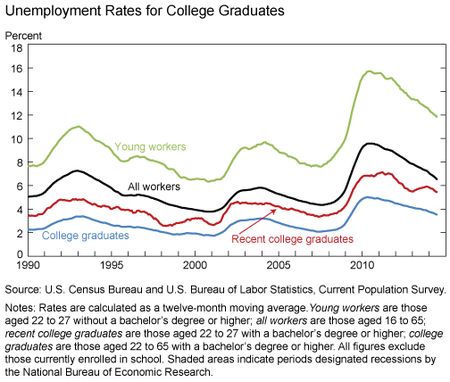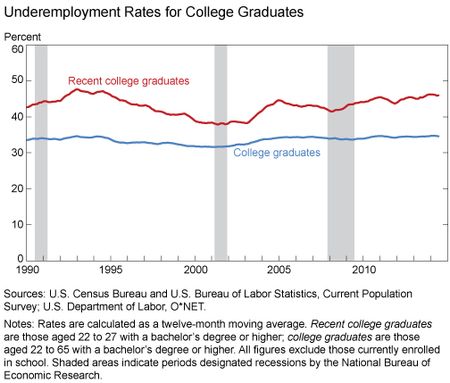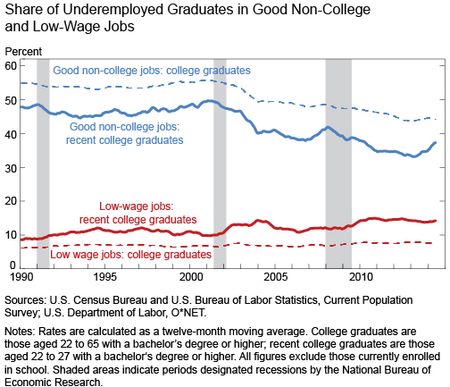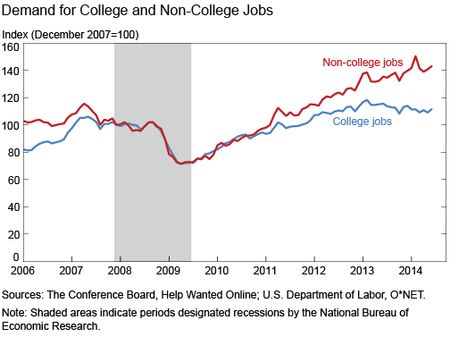Jaison R. Abel and Richard Deitz
This post is the fourth in a series of four Liberty Street Economics posts examining the value
of a college degree.
The promise of finding a good job upon graduation has always been an important consideration when weighing the value of a college degree. In our final post of this week’s blog series, we take a look at the job prospects of recent college graduates. While unemployment among recent graduates has continued to fall since 2011, underemployment has continued to climb—meaning that fewer graduates are finding jobs that make use of their degrees. Do these trends mean that there has been a decline in the demand for those with college degrees? Using data on online job postings, we show that after falling sharply during the Great Recession, the demand for college graduates rebounded during the early stages of the recovery, but has been flat for the past year and a half, suggesting that the demand for college graduates has leveled off. All in all, while finding a job has become easier for recent college graduates over the past few years, finding a good job has not, and doing so is likely to remain a challenge for some time to come.
Unemployment among Recent College Graduates
Let’s start with the good news: more recent college graduates are finding work. As the chart below shows, after reaching a peak of slightly more than 7 percent in 2011, the unemployment rate for recent grads has generally been declining and now stands at just over 5 percent. This is less than half the rate for young workers without a college degree, but still high by historical standards and above the rate for college graduates more generally.
Underemployment among Recent College Graduates
While more recent graduates are finding jobs, they aren’t necessarily finding good ones. Below, we plot the underemployment rate—that is, the share of graduates working in jobs that typically don’t require a college degree—for recent college graduates and college graduates as a whole. (As discussed in our recent Current Issues article, we classify a job as a “college job” if at least 50 percent of the people working in that job indicate that at least a bachelor’s degree is necessary; otherwise, we classify the job as a “non-college job.”) After falling during the economic expansion of the 1990s, the underemployment rate for both groups began rising in 2003 and has continued to climb, more or less, into 2014. It is possible that selection played a role in the rising underemployment rate, in that during both recessions of the 2000s, more people chose to go to college because job prospects were poor, reducing the quality of the average student. Nonetheless, the underemployment rate of recent college graduates now stands at 46 percent, compared with about 35 percent for college graduates as a whole.
Although rising underemployment is certainly troubling, it is important to keep in mind that not all non-college jobs are the same. While there have been widespread stories of recent college graduates working as low-paid baristas, waiters, and retail clerks, many of the underemployed have actually found relatively skilled, well-paid, and career-oriented jobs that do not typically require a bachelor’s degree, such as dental hygienist, electrician, or mechanic. The chart below plots the share of underemployed college graduates working in these types of “good non-college jobs” (which we define as those with a full-time average annual wage of roughly $45,000 or more) as well as those working in “low-wage jobs” (those that tend to pay around $25,000 or less). Here, we see that there is a silver lining to the upward trend in underemployment among recent college graduates: since 2013, a larger share of recent college graduates have found good non-college jobs, while the share of recent college graduates working in low-wage jobs has held steady.
Is the Demand for College Graduates Weakening?
These trends raise troubling questions about whether the demand for the skills one acquires in college has been weakening. This is a provocative question these days: Some believe that demand remains weak as we continue to dig our way out of the last recession, while others suggest that there may be a long-term structural decline in the demand for skilled workers. To help shed some light on this question, we take a look at the Conference Board’s Help Wanted OnLine (HWOL) data, which provides detailed information on job postings advertised online for a wide range of occupations, and thus serves as a good proxy for labor demand. Unfortunately, data are only available beginning in mid-2005, so while we are able to examine the period immediately before and after the Great Recession, we are not able to provide a longer historical perspective. Each posting has an occupation code, so we are able to use the same classification scheme described previously for separating college and non-college job postings, with trends for both groups shown below.
Postings for both groups started to fall just before the onset of the Great Recession, then fell sharply during the recession before picking up during the recovery. What is most interesting for this discussion is that from 2013 to mid-2014, job postings leveled off for college jobs, while they generally continued to increase for non-college jobs. While the number of postings is well above pre-recession levels in both categories, these trends suggest that the demand for college-educated workers may be breaking the trend increase seen during the recovery, and that is not good news for college graduates. Indeed, the fact that non-college postings have continued to climb while college postings have leveled out suggests that recent college graduates are likely to continue to struggle to find good jobs for some time to come.
Conclusion
Although finding a job has gotten easier for recent college graduates during the past few years, landing a good job has not. Indeed, the rising underemployment rate for this group indicates that recent graduates have increasingly continued to take non-college jobs. Although this may sound like getting a college degree is no longer worth the investment, as we’ve emphasized before in our Current Issues article, the economic benefit of a college degree is driven by the value of alternative options—specifically, the type of job and earnings one can get without a college degree—not the absolute level of earnings available to college graduates now compared with the past. As a result, the value of a college degree has remained high over the past decade in large part because of the declining fortunes of those without one. Thus, while the challenges recent graduates have faced in finding a good job might mean that that a college degree will not be as lucrative as it once was, having one is likely to remain better than the alternative.
Disclaimer
The views expressed in this post are those of the authors and do not necessarily reflect the position of the Federal Reserve Bank of New York or the Federal Reserve System. Any errors or omissions are the responsibility of the authors.

Jaison R. Abel is an officer in the Federal Reserve Bank of New York’s Research and Statistics Group.

Richard Deitz is an assistant vice president in the Bank’s Research and Statistics Group.














 RSS Feed
RSS Feed Follow Liberty Street Economics
Follow Liberty Street Economics